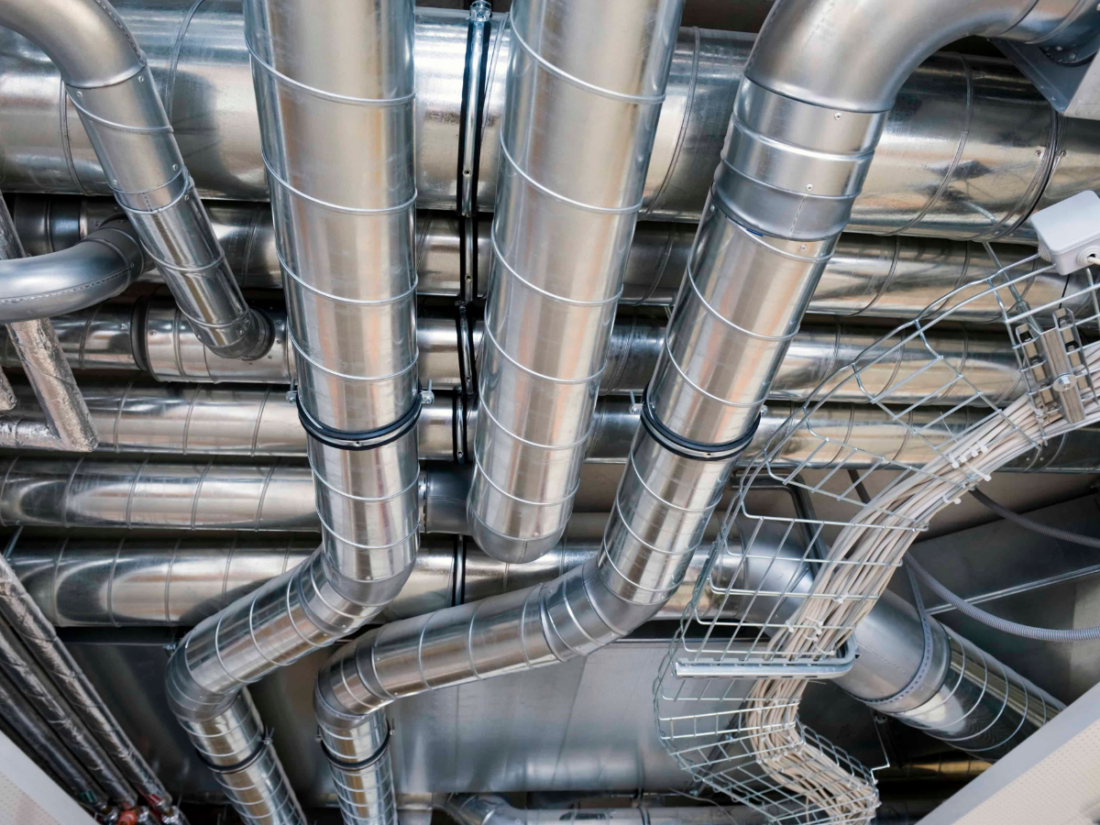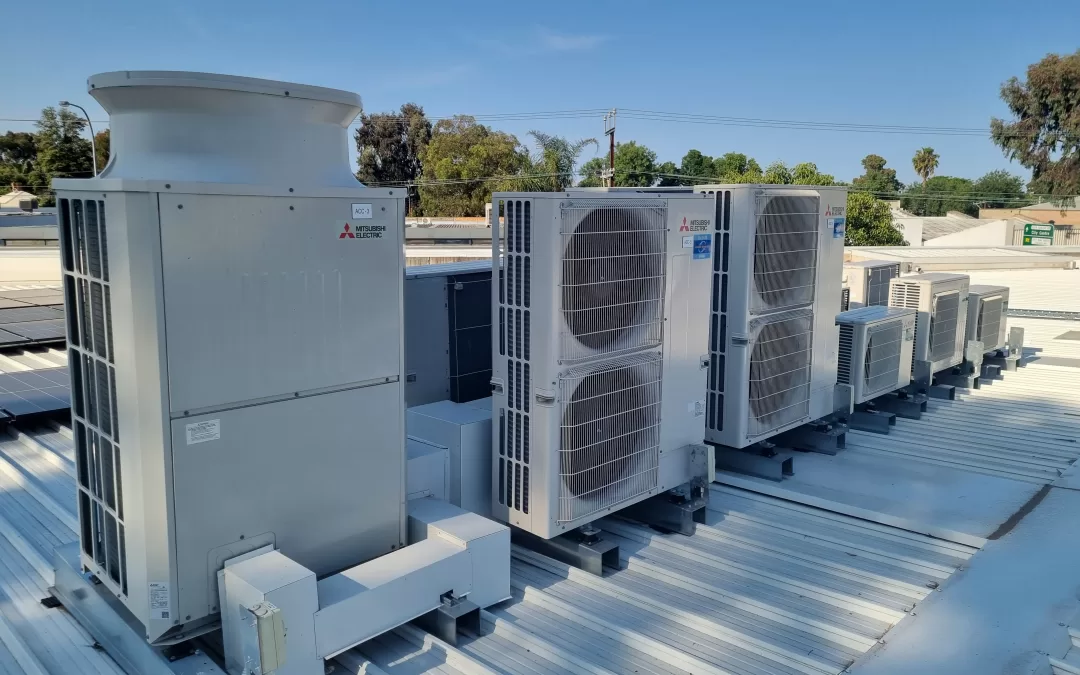Exploring the Crucial Parts of an Efficient Cooling And Heating System
An efficient HVAC system is improved numerous crucial elements that work in harmony. Each part, from the thermostat to the ductwork, plays a vital function in preserving comfort and energy efficiency. Understanding these elements is crucial for optimizing efficiency and boosting interior air high quality. As one analyzes these components, the elaborate relationships in between them disclose understandings into improving overall system effectiveness. What specific elements contribute most to this performance?
The Duty of the Thermostat in Cooling And Heating Performance
Although often ignored, the thermostat plays an important duty in the performance of HVAC systems. HVAC experts. This little device works as the main nerve center, managing temperature setups and making sure perfect convenience within an area. By accurately picking up the ambient temperature, the thermostat connects with the ventilation, home heating, and air conditioning systems to maintain the preferred climate
An effective thermostat minimizes energy usage by turning on the a/c system just when necessary, consequently protecting against excessive heating or air conditioning. Modern programmable and clever thermostats improve this performance further by enabling customers to set timetables and from another location change setups, adapting to day-to-day routines.
Furthermore, the placement of the thermostat is important; inappropriate location can cause incorrect temperature readings, leading to ineffective procedure. Overall, a well-functioning thermostat not only boosts comfort however additionally contributes noticeably to power cost savings and the durability of the heating and cooling system.
Comprehending the Significance of Air Filters
Air filters serve a vital function in heating and cooling systems by guaranteeing that the air circulating within a space continues to be healthy and clean. These filters catch dirt, irritants, and other pollutants, preventing them from being recirculated throughout the setting. By recording these particles, air filters add to enhanced indoor air quality, which can substantially profit owners' health, particularly those with allergies or breathing problems.
In addition, preserving tidy air filters boosts the effectiveness of a/c systems. Blocked filters can restrict air flow, causing the system to function more difficult to keep preferred temperatures, bring about enhanced power usage and greater utility costs. Consistently replacing or cleaning filters is a crucial maintenance action that can prolong the lifespan of heating and cooling equipment. Ultimately, understanding the significance of air filters allows home owners and structure managers to take positive actions to guarantee a well-functioning, effective HVAC system that promotes a risk-free and comfy interior environment.

The Functionality of the Heating System and Heat Pump
Heating systems and heat pumps are important components of cooling and heating systems, in charge of providing warmth throughout colder months. Furnaces run by home heating air through burning or electric resistance, then dispersing it throughout the home via air ducts. They normally offer fast heating and can be sustained by all-natural gas, electricity, or oil, depending upon the system kind.
Alternatively, heat pumps transfer heat instead of create it. They remove heat from the outside air or ground, even in low temperature levels, and move it inside. HVAC experts. This twin performance enables heatpump to likewise offer air conditioning in warmer months, making them functional alternatives for year-round environment control
Both systems require proper maintenance to guarantee effectiveness and durability. While heating systems master extreme chilly, heatpump can be helpful in modest environments. Comprehending their unique capabilities help home owners in picking one of the most ideal alternative for their home heating needs.
Checking Out the Air Conditioning Unit
The air conditioning device is a vital part of HVAC systems, readily available in numerous kinds to fit various demands. Understanding the performance rankings of these units is vital for making informed choices concerning power usage and expense. This section will certainly discover the varied sorts of air conditioning unit and make clear Bonuses just how performance scores impact efficiency.
Sorts Of Air Conditioners
While various variables affect the choice of cooling systems, recognizing the various types available is crucial for property owners and building supervisors alike. Central air conditioners are designed to cool down entire homes or structures, using a network of air ducts for air flow. Window systems provide an even more local remedy, perfect for single areas or little rooms. Portable air conditioners give versatility, allowing customers to move the unit as required. Ductless mini-split systems are another alternative, integrating the efficiency of main systems with the benefit of zoning, as they require no ductwork. Lastly, geothermal systems harness the earth's temperature level for energy-efficient cooling. Each kind comes with distinctive advantages, making educated choices crucial for effective climate control.

Effectiveness Rankings Discussed
Recognizing efficiency rankings is important for picking the best cooling unit, as these metrics supply insight into the system's efficiency and power consumption. One of the most typical rating for air conditioning unit is the Seasonal Power Efficiency Proportion (SEER), which determines the cooling output throughout a typical cooling season separated by the total electric energy input. A higher SEER shows far better efficiency. Furthermore, the this link Power Performance Ratio (EER) is used for determining performance under details conditions. Another essential metric is the Power Celebrity certification, which represents that a system satisfies stringent energy performance standards. By evaluating these ratings, consumers can make informed choices that not only enhance comfort however likewise minimize power prices and environmental impact.
The Importance of Ductwork and Air flow
Effective ductwork layout and air movement management play vital roles in the general efficiency and performance of HVAC systems. Correct ductwork guarantees that conditioned air is dispersed equally throughout a room, minimizing temperature changes and improving convenience. Well-designed ducts reduce resistance to air flow, lowering the work on cooling and heating tools and inevitably the original source decreasing energy intake.
Airflow monitoring involves purposefully putting vents and registers to boost the circulation of air. This stops common issues such as warm or cool spots, which can take place when air movement is obstructed or improperly balanced. Furthermore, the appropriate air duct products and insulation can even more improve performance by reducing warm loss or gain during air transportation.
A reliable ductwork system not only adds to energy financial savings however can likewise prolong the life-span of cooling and heating tools by lowering unneeded stress (HVAC experts). Recognizing the relevance of ductwork and air movement is essential for accomplishing peak Cooling and heating system efficiency.
Routine Maintenance Practices to Boost Efficiency
Regular upkeep practices are essential for guaranteeing peak performance of heating and cooling systems. These methods consist of regular assessments, cleaning, and essential fixings to maintain the system running effectively. On a regular basis changing air filters is important, as blocked filters can block airflow and reduce effectiveness. Additionally, technicians must inspect and tidy evaporator and condenser coils to protect against overheating and energy wastage.
Annual professional evaluations are likewise suggested, as trained professionals can determine potential issues before they rise. Lubricating relocating components lessens damage, adding to a much longer life-span for the system. Furthermore, making sure that the thermostat functions properly aids in preserving perfect temperature level control.

Often Asked Inquiries
Exactly how Often Should I Change My Thermostat?
Thermostats ought to typically be changed every 5 to 10 years, depending on use and technology improvements. Normal checks are suggested to guarantee peak performance, specifically if experiencing inconsistent temperature control or raised energy prices.
What Size Air Filter Is Ideal for My Heating And Cooling System?
The very best dimension air filter for a heating and cooling system differs by device layout. Typically, it's essential to consult the owner's manual or examine the existing filter measurements to ensure peak performance and air quality.
Can I Install a Heatpump Myself?
Mounting a warm pump independently is possible for skilled people, however it requires knowledge of local codes and electric systems. Working with a professional is suggested to assure proper setup and suitable system performance.
How Do I Know if My Ductwork Is Reliable?
To identify ductwork efficiency, one need to look for leaks, action air flow at vents, inspect insulation top quality, and assess temperature level distinctions between supply and return air ducts. Specialist evaluations can provide detailed insights right into overall efficiency.
What Are Signs My HVAC Requirements Immediate Maintenance?
Indications that a HVAC system requires immediate maintenance consist of unusual sounds, irregular temperatures, raised energy costs, unpleasant smells, and frequent biking. Addressing these problems quickly can prevent additional damage and assurance top system efficiency.
Air filters serve a crucial function in A/c systems by guaranteeing that the air flowing within a space stays tidy and healthy. In addition, maintaining clean air filters improves the efficiency of Heating and cooling systems. Ductless mini-split systems are an additional alternative, combining the effectiveness of main systems with the ease of zoning, as they require no ductwork. Recognizing effectiveness scores is necessary for choosing the best air conditioning unit, as these metrics supply understanding right into the system's efficiency and power intake. The best dimension air filter for a Heating and cooling system varies by system style.